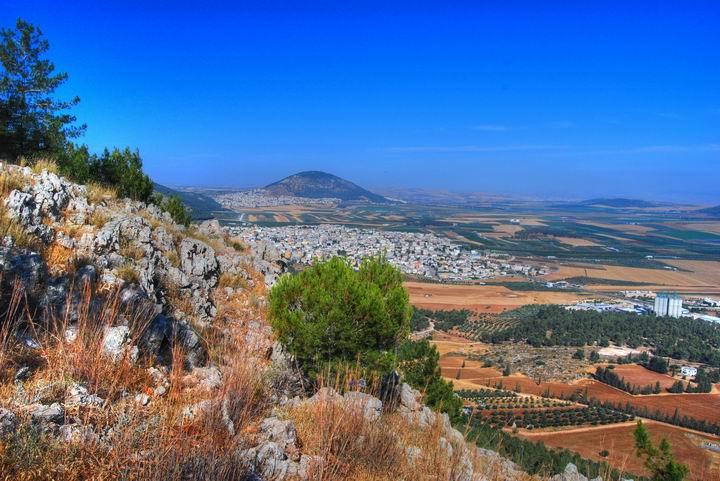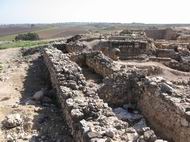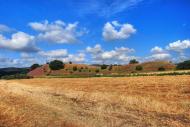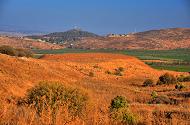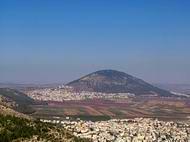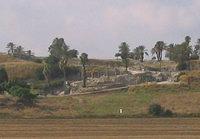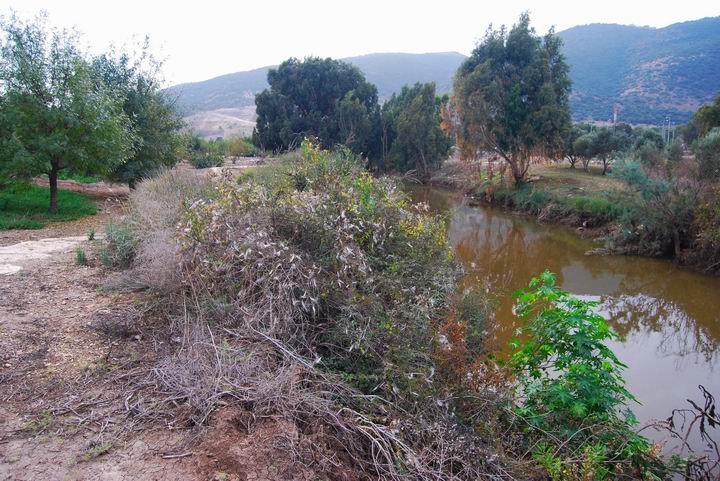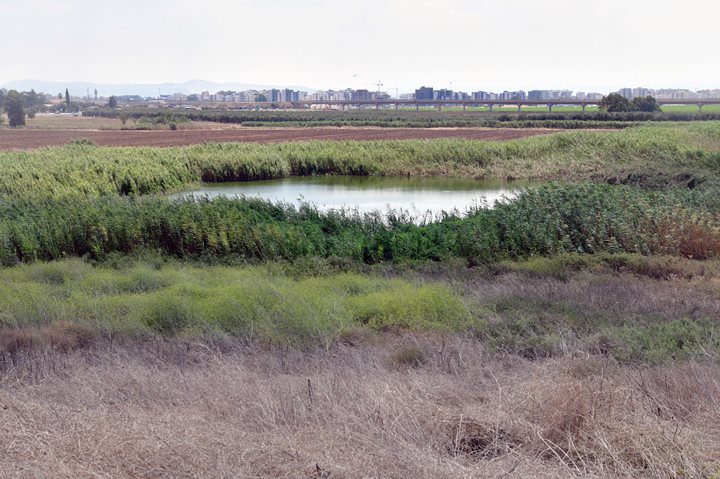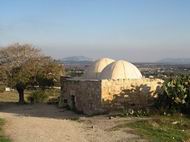This page summarizes the sites associated with the army chief Barak, son of Abinoam, and the prophetess Deborah who judged Israel at that time.
Judges 5 :1-2: “Then sang Deborah and Barak the son of Abinoam on that day, saying, Praise ye the LORD for the avenging of Israel, when the people willingly offered themselves…”
Home > Info > People > Deborah & Barak
Contents:
Background
Deborah
Barak
Map
Photos
Sites of battle
Other sites
Biblical
Etymology
Links
Historical background:
Deborah was a prophetess and judge in Israel during a period of turmoil and conflict. The narrative of Judges indicates that the Israelites were under the oppression of the Canaanites, particularly King Jabin of Hazor, and his commander, Sisera. Deborah, acting as a leader and judge, summoned Barak and informed him that it was time to rally the Israelite tribes and confront the Canaanite forces.
Barak hesitated to go into battle without Deborah’s presence, and she agreed to accompany him. They gathered an army, and with Deborah’s guidance, they faced the Canaanite forces led by Sisera. The battle took place in the vicinity of Mount Tabor, according to the biblical account.
As the story goes, with the help of divine intervention and tactical maneuvers, the Israelites achieved a decisive victory over the Canaanites. Sisera, the Canaanite commander, fled on foot and sought refuge in the tent of a woman named Jael. However, Jael killed Sisera by driving a tent peg through his temple while he was sleeping, fulfilling a prophecy Deborah had made about the Canaanite leader’s fate.
The victory of the Israelites in this battle had significant implications. It weakened the hold of the Canaanites in the region and contributed to the eventual conquest and settlement of the Promised Land by the Israelites. The “Song of Deborah” in Judges 5 is a poetic celebration of this victory, highlighting the role of Deborah, Barak, and other tribes in the battle.
The events of the “battle of Deborah” are considered a pivotal moment in the biblical narrative of Israel’s early history, as they reflect themes of divine intervention, leadership, and the struggle for freedom against oppressive forces. The conquest of Hazor and the victory over Sisera marked a significant step toward the Israelites’ establishment in the land of Canaan.
Psalms 83 :9-10:
“Do unto them as unto the Midianites; as to Sisera, as to Jabin, at the brook of Kison: Which perished at Endor: they became as dung for the earth”. The battle also appears in the new testament, where Barak appears in the list of Biblical heroes: Hebrews 11:32: “And what shall I more say? for the time would fail me to tell of Gedeon, and of Barak, and of Samson, and of Jephthae; of David also, and Samuel, and of the prophets:”.
Deborah:
Deborah (“bee”) was a prophetess and tribal leader (judge), from the tribe of Ephraim. Her primary mission in the battle was a political task – to convince the tribes to send soldiers to the Israelite Army.
As she later summarizes her efforts in a song she wrote to commemorate the victory, only part of the tribes sent their men into the battle. Barak, we are told by the Bible, requested that Deborah will join him in the battle, as a condition for his acceptance of the command. This request was from political reasons, since the tribes were not united and hesitated to help the three tribes (Issachar, Naphtali and Zebulun) who suffered the most from the Northern Canaanite cities. Her presence was one of the factors for their victory.

“Deborah” – by Gustav Dore (French artist, 1832-1883)
Another Deborah is mentioned in earlier times in the Bible – she was the nurse-midwife of Rebekah, the wife of Patriarch Jacob (Genesis 35:8 ” But Deborah, Rebekah’s nurse, died, and she was buried beneath Bethel under an oak: and the name of it was called Allonbachuth”.). It is interesting that both Deborahs sat beneath a tree near Bethel (Judges 4,5: “And she dwelt under the palm tree of Deborah between Ramah and Bethel”). Thus, it may be the same tree, so the Bible gives prophetess Deborah a high credit by linking her to the Patriarchs.
Barak, son of Abinoam:
Barak (“lightening”), son of Abinoam, was the great hero of the day. His tactical management of the battle turned a possible defeat into a glorious victory. He knew that the Israelites have no match against the 900 chariots of iron of the Canaanites. After all, they had none, and could not win face to face on even ground. So he cleverly selected a place where the chariots were ineffective – they could not climb up Mt Tabor, and they were useless in the swampy grounds of the Kishon brook and the muddy grounds of the Jezreel valley. Barak selected a rainy day for the battle ( “They fought from heaven… The river of Kishon swept them away…”). Barak and the 10,000 Israelites held the high ground, and descended upon the Canaanites. They dispersed in panic and were chased for 30 Km until completely wiped out.
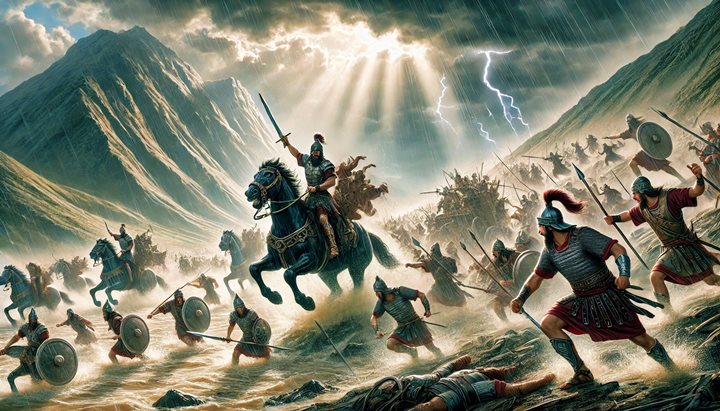
Illustration of the battle between Barak and Sisera
(Image created by AI using DALL·E through OpenAI’s ChatGPT)
Barak was a modest man, and he hesitated initially to take the leadership. He also shared the honors of victory with Deborah (How many generals would do so?). The honors for the hero still continues to date: his name is widely used, such as US President Barak Obama and Israel’s Ehud Barak.
Map of the battle:
The map of the battle is seen on the following view of Jezreel valley, with the red lines showing the Canaanite movements and the blue lines belong to the Israelite forces.
This is the sequence of the battle of Deborah (the numbers are indicated on the map):
1. Israelites forces assemble near the Tabor. They are based on two tribes, with volunteers from other tribes
2. Canaanite forces assemble near Megiddo from many north cities, commanded by Sisera
3. Israelites take the high ground position on Mt Tabor, giving them advantage
4. Canaanites rush to crush the Israelites below the Tabor, but their chariots cannot climb the high mountain
5. Israelites wait for rainy day, then attack from Mount Tabor
6. The Canaanite forces break in panic; their chariots stuck in the mud
7. Since the Kishon river blocks them from retreating south, they go west along the Kishon
8. The Israelites wipe them out, reaching as far as Mt Carmel (near Horoshet of the Gentiles, Sisera’s home about 30KM west of Mt Tabor)
9. Sisera runs away, but is killed in Yael’s tent on his way to the east

Photos:
In the photo below is a view of the battlefield, as seen from Mt Precipice, south of Nazareth. Mt Tabor is the high rounded hill seen in the center background, where the Israelite forces camped. The Jezreel valley, where the Canaanite forces camped, is located in the fields on the right.
Sites of the battle, featured in BibleWalks:
The following table lists the sites of the events from the battle of Deborah, which are featured in BibleWalks. Click on the site’s name to see more information on each site.
a. Hazor
- 4:2″ And the LORD sold them into the hand of Jabin king of Canaan, that reigned in Hazor”
- Tell Hazor is one of the largest, most important biblical sites in the Canaanite and Israelite periods. The bible gave it the title: “the head of all those kingdoms”.
- Click on the photos to enlarge them:
b. “Harosheth of the Gntiles” Geva (Gaba)
- 4:2: “the captain of whose host was Sisera, which dwelt in Harosheth of the Gentiles.
- Tell Mea’mer is a biblical city on the eastern side of Mt Carmel, identified with “Harosheth of the Gentiles”. Nearby sites, Kh. Harithiya and K. Haroshet, preserved its name.
- Another identification is the forests (Horshoth) in the area of lower Galilee.
c. Kedesh- Naphtali (Tell Kedesh?)
- 4,6: “And she sent and called Barak the son of Abinoam out of Kedeshnaphtali,”
- Kedesh-Naphtali was a major city at the northern section of Naphtali. It is located on the west side of Hula lake in the upper Galilee.
- Another identification is Tel Kedesh– a ruin near Poriya, in the south-west side of Sea of Galilee.
d. Mount Tabor
- 4:6 “… Go and draw toward mount Tabor, and take with thee ten thousand men of the children of Naphtali and of the children of Zebulun?”
- Mount Tabor is a steep round hill on the north-east side of Yizreel valley. It played an important role in the biblical history, and tradition links it to the Transfiguration of Jesus. The hill is strategically located on the main north-south ancient road.
e. Taanach near Megiddo
- 5: 19 “The kings came and fought, then fought the kings of Canaan in Taanach by the waters of Megiddo; they took no gain of money”.
The site is situated on the gateway on the road linking North and South of Israel, about 30 Km south-east of Haifa. The archeologists uncovered 26 layers of ancient cities, starting before the bronze age (4000 BC) until the Greeks (4th C BC).
f. Kishon Brook
- Jezreel valley, and north of Mt. Carmel.
- 4,7: “And I will draw unto thee to the river Kishon Sisera, the captain of Jabin’s army, with his chariots and his multitude; and I will deliver him into thine hand.”
- The Kishon creek passes through additional ancient sites, including Tell Mea’mer (Geva, Gaba).
- The swamps along the Kishon, such as around Tel Yifar, prevented the Canaanite chariots to cross south, forcing them to go west and subsequently be perished by the Israelites.
Other sites:
Other sites associated with Barak and Deborah, that are featured in BibleWalks:
g. Beit Shearim (Sheik Ibrik)
- Beit Shearim is one of the most famous sites in Israel, due to its remarkable necropolis, where a series of catacombs were excavated in the hill side .
- A sheik’s tomb (Sheik Ibrik) is located on the south-east side, which may have been named after Barak.
Biblical References:
Judges 4
This chapter describes the battle of Barak, heading the Israelites, against Sisera commander of the Canaanite army.
“And the children of Israel again did evil in the sight of the LORD, when Ehud was dead. And the LORD sold them into the hand of Jabin king of Canaan, that reigned in Hazor; the captain of whose host was Sisera, which dwelt in Harosheth of the Gentiles. And the children of Israel cried unto the LORD: for he had nine hundred chariots of iron; and twenty years he mightily oppressed the children of Israel.
And Deborah, a prophetess, the wife of Lapidoth, she judged Israel at that time. And she dwelt under the palm tree of Deborah between Ramah and Bethel in mount Ephraim: and the children of Israel came up to her for judgment. And she sent and called Barak the son of Abinoam out of Kedeshnaphtali, and said unto him, Hath not the LORD God of Israel commanded, saying, Go and draw toward mount Tabor, and take with thee ten thousand men of the children of Naphtali and of the children of Zebulun? And I will draw unto thee to the river Kishon Sisera, the captain of Jabin’s army, with his chariots and his multitude; and I will deliver him into thine hand. And Barak said unto her, If thou wilt go with me, then I will go: but if thou wilt not go with me, then I will not go. And she said, I will surely go with thee: notwithstanding the journey that thou takest shall not be for thine honor; for the LORD shall sell Sisera into the hand of a woman.
And Deborah arose, and went with Barak to Kedesh. And Barak called Zebulun and Naphtali to Kedesh; and he went up with ten thousand men at his feet: and Deborah went up with him. Now Heber the Kenite, which was of the children of Hobab the father in law of Moses, had severed himself from the Kenites, and pitched his tent unto the plain of Zaanaim, which is by Kedesh. And they showed Sisera that Barak the son of Abinoam was gone up to mount Tabor.
And Sisera gathered together all his chariots, even nine hundred chariots of iron, and all the people that were with him, from Harosheth of the Gentiles unto the river of Kishon. And Deborah said unto Barak, Up; for this is the day in which the LORD hath delivered Sisera into thine hand: is not the LORD gone out before thee? So Barak went down from mount Tabor, and ten thousand men after him. And the LORD discomfited Sisera, and all his chariots, and all his host, with the edge of the sword before Barak; so that Sisera lighted down off his chariot, and fled away on his feet. But Barak pursued after the chariots, and after the host, unto Harosheth of the Gentiles: and all the host of Sisera fell upon the edge of the sword; and there was not a man left.
Howbeit Sisera fled away on his feet to the tent of Jael the wife of Heber the Kenite: for there was peace between Jabin the king of Hazor and the house of Heber the Kenite. And Jael went out to meet Sisera, and said unto him, Turn in, my lord, turn in to me; fear not. And when he had turned in unto her into the tent, she covered him with a mantle. And he said unto her, Give me, I pray thee, a little water to drink; for I am thirsty. And she opened a bottle of milk, and gave him drink, and covered him. Again he said unto her, Stand in the door of the tent, and it shall be, when any man doth come and inquire of thee, and say, Is there any man here? that thou shalt say, No. Then Jael Heber’s wife took a nail of the tent, and took an hammer in her hand, and went softly unto him, and smote the nail into his temples, and fastened it into the ground: for he was fast asleep and weary. So he died.

“Jael and Sisera” – by Gustav Dore (French artist, 1832-1883)
And, behold, as Barak pursued Sisera, Jael came out to meet him, and said unto him, Come, and I will show thee the man whom thou seekest. And when he came into her tent, behold, Sisera lay dead, and the nail was in his temples. So God subdued on that day Jabin the king of Canaan before the children of Israel. And the hand of the children of Israel prospered, and prevailed against Jabin the king of Canaan, until they had destroyed Jabin king of Canaan”.
Judges 5
This chapter is called the “song of Deborah”.
“Then sang Deborah and Barak the son of Abinoam on that day, saying, Praise ye the LORD for the avenging of Israel, when the people willingly offered themselves. Hear, O ye kings; give ear, O ye princes; I, even I, will sing unto the LORD; I will sing praise to the LORD God of Israel. LORD, when thou wentest out of Seir, when thou marchedst out of the field of Edom, the earth trembled, and the heavens dropped, the clouds also dropped water. The mountains melted from before the LORD, even that Sinai from before the LORD God of Israel. In the days of Shamgar the son of Anath, in the days of Jael, the highways were unoccupied, and the travellers walked through byways. The inhabitants of the villages ceased, they ceased in Israel, until that I Deborah arose, that I arose a mother in Israel. They chose new gods; then was war in the gates: was there a shield or spear seen among forty thousand in Israel? My heart is toward the governors of Israel, that offered themselves willingly among the people. Bless ye the LORD. Speak, ye that ride on white asses, ye that sit in judgment, and walk by the way. They that are delivered from the noise of archers in the places of drawing water, there shall they rehearse the righteous acts of the LORD, even the righteous acts toward the inhabitants of his villages in Israel: then shall the people of the LORD go down to the gates.
Awake, awake, Deborah: awake, awake, utter a song: arise, Barak, and lead thy captivity captive, thou son of Abinoam. Then he made him that remaineth have dominion over the nobles among the people: the LORD made me have dominion over the mighty. Out of Ephraim was there a root of them against Amalek; after thee, Benjamin, among thy people; out of Machir came down governors, and out of Zebulun they that handle the pen of the writer. And the princes of Issachar were with Deborah; even Issachar, and also Barak: he was sent on foot into the valley. For the divisions of Reuben there were great thoughts of heart. Why abodest thou among the sheepfolds, to hear the bleatings of the flocks? For the divisions of Reuben there were great searchings of heart. Gilead abode beyond Jordan: and why did Dan remain in ships? Asher continued on the sea shore, and abode in his breaches. Zebulun and Naphtali were a people that jeoparded their lives unto the death in the high places of the field.
The kings came and fought, then fought the kings of Canaan in Taanach by the waters of Megiddo; they took no gain of money. They fought from heaven; the stars in their courses fought against Sisera. The river of Kishon swept them away, that ancient river, the river Kishon. O my soul, thou hast trodden down strength. Then were the horsehoofs broken by the means of the pransings, the pransings of their mighty ones. Curse ye Meroz, said the angel of the LORD, curse ye bitterly the inhabitants thereof; because they came not to the help of the LORD, to the help of the LORD against the mighty.
Blessed above women shall Jael the wife of Heber the Kenite be, blessed shall she be above women in the tent. He asked water, and she gave him milk; she brought forth butter in a lordly dish. She put her hand to the nail, and her right hand to the workmen’s hammer; and with the hammer she smote Sisera, she smote off his head, when she had pierced and stricken through his temples. At her feet he bowed, he fell, he lay down: at her feet he bowed, he fell: where he bowed, there he fell down dead.
The mother of Sisera looked out at a window, and cried through the lattice, Why is his chariot so long in coming? why tarry the wheels of his chariots? Her wise ladies answered her, yea, she returned answer to herself, Have they not sped? have they not divided the prey; to every man a damsel or two; to Sisera a prey of divers colors, a prey of divers colors of needlework, of divers colors of needlework on both sides, meet for the necks of them that take the spoil? So let all thine enemies perish, O LORD: but let them that love him be as the sun when he goeth forth in his might. And the land had rest forty years.”
Etymology (behind the name):
- Barak – Hebrew: Lightning. He was the commander of the Israelite army who defeated the Canaanite armies.
- Abinom – Hebrew: Avinoam, from Avi (father, meaning God) and Noam (pleasant). Father of Barak.
- Deborah: Hebrew: Bee. She was a prophetess and a tribal leader during the battle named after her, which was commanded by Barak.
- Jabin – Hebrew Yavin: “Will perceive”, based on the root name of Binah (wisdom). There were two Kings in the Canaanite mega-polis Hazor, during Joshua’s conquest (when Hazor was burnt) and during the battle of Deborah. Perhaps, they belong to a dynasty of Kings.
- Sisera – unknown meaning; Some sites provide clues of the meaning of the commander of the Canaanite armies in the battle of Deborah.
- Jael – Hebrew: Yael, meaning: Ibex. She was part of the Kenite clan, and killed Sisera with the tent’s nail.
Links:
- Article (in Hebrew): Historical events in Jezreel valley – Deborah & Barak
- Biblical pictures by Gustave Doré (1832-1883) – public domain
BibleWalks.com – walk with us through the sites of the Holy Land
Nabateans<<<—Previous Info —<<< All Info >>>—Next Info—>>> St. Peter
This page was last updated on Dec 3, 2024 (add AI illustration)
Sponsored links:
